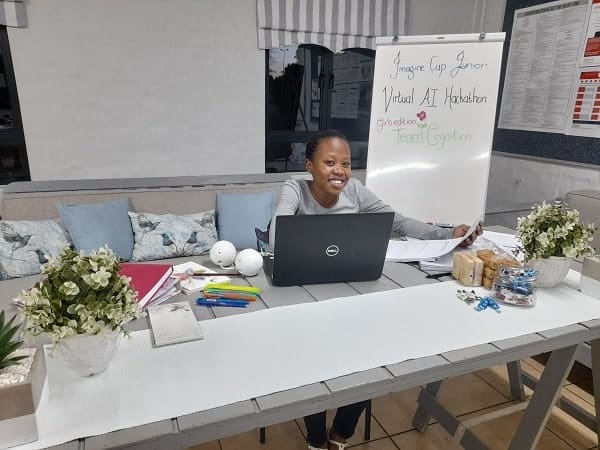Curro Academy Pretoria’s Grade 11 learner, Tsakane Koko and her team made our country proud by finishing in second place at the “Olympics of Technology”, the Imagine Cup Junior Virtual Artificial Intelligence Hackathon, Girls Edition 2021.
The Olympics of Technology provides learners with a platform to bring their ideas to life.
Sponsored by Microsoft and in partnership with UNESCO, the Hackathon challenge is a live international event where teams (of 2-5 individuals) compete by trying to solve real-world problems using Artificial Intelligence (AI).
At the Olympics of Technology, Tsakane’s team competed against 21 other countries, including Egypt, Canada, England, and Croatia, among others.
This challenge is exclusively for high school girls between 14 to 18 years who excel at Mathematics and Computer Science and are interested in pursuing a career in AI.
During the challenge, the girls were taken on a practical journey into the heart of AI, to help them develop widely applicable machine learning skills in the context of sustainability, biodiversity loss and climate change.
How the Hackathon works, is each team presents their big idea to a group of ‘investors’ in the first round. A total of 22 teams competed and 11 were chosen to go through to round 2. After the second presentation, Tsakane and her team came in at a second place.
Charlotte Jooste, phase head at Curro Academy Pretoria, describes Tsakane as a top learner and assisted her in preparation for the challenge.
“The school was informed of the challenge, and decided to put Tsakane forward as a viable candidate – for which she was selected to take part,” she said.
Chosen just a few days before the challenge weekend, Tsakane had to quickly meet her new teammates from different Curro schools around the country. The team, called ‘Cognition’ consisted of Tsakane Koko, Hesme Cronje (Grade 12, Curro Heritage House), Humbulani Mudziwa (Grade 12, Curro Academy Soshanguve), Anamika Beethasi (Grade 11, Curro Waterfall) and Tahlia Bell (Grade 10, Curro Mossel Bay).
For the challenge, the team prepared a presentation with ideas to help trace and locate African Wild Dogs, using AI.
In the early stages of the Hackathon, the learners were given a tour on how the challenge will work as well as shown online demos to work with to get a feel for the capabilities of AI. The next step was to take data and apply machine learning code to it. The end goal was for all the girls taking part in the challenge to design the outline of a web service that uses AI.
Team Cognition then made use of AI to search social media posts containing any geo-tags or hashtags relating to African wild dogs or their known residents.
“Their presentation focussed on AI methods to pick up any indications in the wild dogs’ behaviour that could link to illness or other threats as well as interventions. This way the animals receive little human intervention and therefore live a more “natural” life,” Jooste said.
“The team’s presentation also covered ensuring that wild dogs be protected from geological disasters or processes like droughts, floods, etc. as well as human activities.”
Jooste further added that the challenge gave Tsakane, and her teammates a whole new perspective of ‘new’ jobs out there and careers that she might look into in the future.
Tsakane’s father, Sello Koko, said the challenge helped learners to tackle some of the world’s toughest challenges by thinking outside the box.
“Tsakane did very well, and we thank the teachers for helping her prepare for the challenge. As a father, I am very proud of her, she is a top learner – she’s smart and works hard. This challenge was a great platform for her to challenge herself with the best learners around the globe,” he said.

